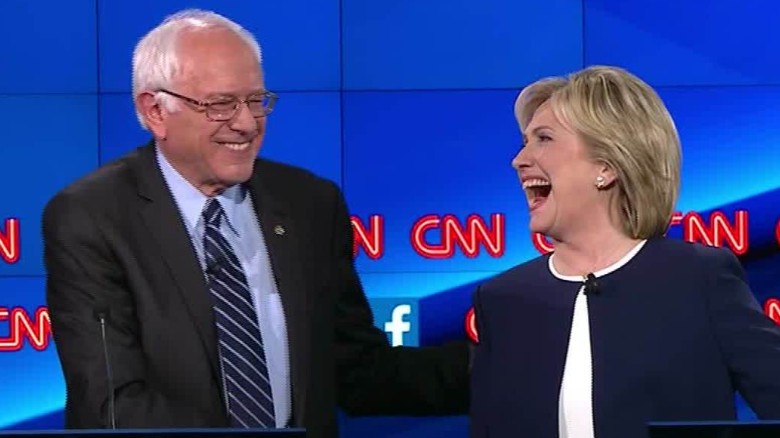
Bernie Sanders’ autobiography, “Outsider in the White House,” was published in South Korea under a new title, “Bernie Sanders’s Political Revolution.” As Sanders campaigned for the presidency, the younger generation of America met him with great passion in a sort of political revolution of their own, a revolution embodied by this new title. The Sanders storm has proven that the critics and the corporate media spoke too soon when they scorned Occupy Wall Street and claimed the movement achieved nothing.
Of course, Sanders or any others with such political ideology won’t be elected president so easily. In fact, it’s generally predicted that Hillary Clinton will be the Democratic candidate due to Sanders’s defeat in a recent primary. But more important than the results are those inspired by his words. Media analysis has shown that America’s political climate is reaching a turning point.
Nevertheless, I don’t want to discuss the Sanders trend today. This is not because I undervalue Sanders or sympathize with his competitor Hillary. As a scholar lecturing on political communication, I can’t start a discourse on this topic while turning a blind eye to Korea’s reality.
Currently, Korea’s political communication closely follows the American model of a dual conservative party system, rather than the European model of power exchange between the conservative and progressive parties. However, neither the American nor European model correctly describes Korean politics in full.
Let’s carefully examine what would happen if the Korean president decided to solicit the public on Labor Day to join labor unions, and said that many of our privileges today were acquired through these unions. Although this often occurs in America, the situation in Korea would be quite different. We can easily imagine what criticism the politico-media complex of the Chosun, JoongAng, and DongA newspapers and the KBS, SBS, and MBC broadcast channels would pour out against the president. As it is, Presidents Lee Myung-bak, Park Geun-hye, Kim Dae-jung, and Roh Moo-hyun wouldn’t have dared to give such a speech.
However, U.S. President Barack Obama had recommended union membership without hesitation. Is Obama a radical leftist? Not at all. The concept of the labor movement helping the growth of democracy is not a specific view, but a world reality.
This position isn’t limited to Obama. “When unions are strong, America is strong,” Hillary stated publicly in her labor policy proposal.
Hillary has highlighted the importance of reinforcing the union’s say in running an enterprise. She also introduced a profit-sharing plan for workers. Additionally, Hillary’s economic adviser and former Treasury Secretary Larry Summers suggested a policy of “inclusive prosperity,” which states that bargaining rights of unions must expand in order to evenly distribute the profit of enterprises.
Furthermore, even the Republican primary candidate, Donald Trump, who is often portrayed in the media as a “maniac,” has proclaimed that he would increase taxes on the rich.
The impetus for America’s political change can be traced back to dissatisfaction with the global economic stagnation brought on by the greed of Wall Street in 2008. Some reflect that neoliberal policies aren’t enough to overcome the long term stagnation. Meanwhile, Korea’s economy is sinking far more than America’s is — it’s no surprise that a number of college students feel that our country is a “Republic of Failure.”
However, as America’s political system begins to shift leftward, Korea’s political system continues to shift to the right. This is not to single out President Park Geun-hye, who continues to ignore the nation’s fury despite the results of the 20th election. Kim Jong-In of the Minjoo Party of Korea and Ahn Cheol-soo of the People’s Party continue to hold their heads high, having earned unexpected seats in the election. They don’t blink an eye, even as the Minjoo Party of Korea is being berated as activist and idealist for being unable to implement progressive policies during its time in office.
Even if we excuse Kim Jong-In and Ahn Cheol-soo for their lack of “philosophy” or experience in the democratic movement, the fact that congressmen who have actually participated in student, civil, and labor movements are censoring and distancing themselves from “movements” in fear of “Chosun, JoongAng, and DongA” is a bittersweet reality. I want to ask this: Has Sanders, who has been taking part in student and civil movements, changed his “grammar”? If Sanders is too much for you, look at Hillary. Is there a politician in our political waters who can promise in the next election cycle as much as Hillary is currently promising in her election campaign?
Regression of politics in Korea is related to the reality of our media. Media monopolies that control public opinion constantly attack unions as being “nobility” and vested interests. However, the regression is not entirely the fault of the media.
Perhaps it’s time to point the finger at politicians who keep bringing up public livelihood at the end of every sentence, especially those who have listed student, civil and labor movements in their resumes to seat themselves in Congress. I don’t want to even try comparing Sanders to them. As I write, I am ashamed to say the most I can hope for is that they would at least try to follow the examples of Obama and Hillary. My heart hurts when I remember those who have died without receiving the love and reputation that they deserve.
To those thoughtful voters who are envious of the Sanders storm, do you believe our nation can even hope for a Hillary? In asking this, I am not attempting to be critical. I only propose that we try to come up with a Hillary — or even better, a Sanders.

Leave a Reply
You must be logged in to post a comment.